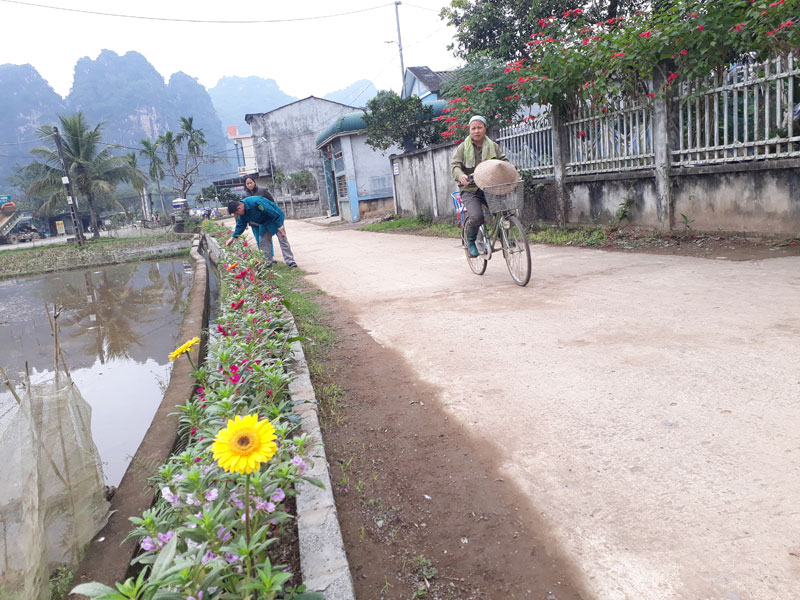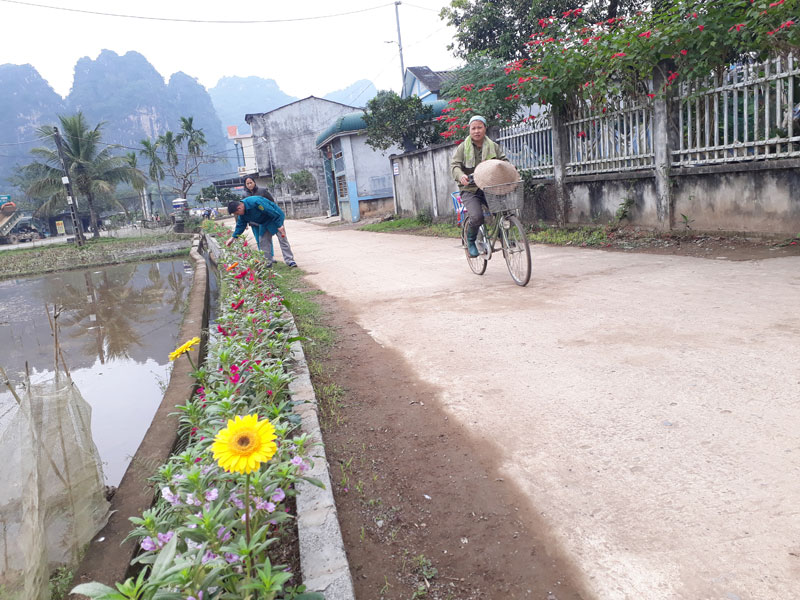
(HBO) Nearly half a year after planting, those who are passing through continuously praise for the village roads filled with the colorful flowers.
"The path of blooming flowers” is a model showing the determination of the Farmers' Association of Quy Hau commune (Tan Lac) in an effort to build a new lifestyle and are gradually completing the new rural criteria.

Freshness coming from "the path of
blooming flowers" is brilliant with flowers in Khang 3 village, Quy Hau
commune (Tan Lac).
Back in Quy Hau in the days closing to Lunar
New Year, we are really impressed by the roads full of colorful flowers right
next to the headquarter of the commune’s people's committee. Talking about
these changes, Ms. Bui Thi Hiep, the chairwoman of the commune’s Farmers’
Association says that after the field trip in Ha Tinh province, we have had the
idea of planting flowers to beautify the village roads and alleys. With the
coordination between the Farmers’, Veterans’, Women’s and Commune Youth Union
Associations, as well as people's contributions, the model was first
implemented in Khang 3 village with a length of over 200 meters. Realizing the
practical effect, the model continued to be replicated in Khang 3 village with
a length of 400 meters after the implementation period.
The concreted paths are adorned with colorful flowers. The construction of the
flower paths in Khang 3 village is quite feat. The solid flower bathtubs, which
are 20 - 30 cm higher than concreted pavement, were built by bricks, then they
were filled with soil to plant flowers. The paths are near the ditch, which is
convenient for taking care of and watering flowers daily. Mr. Bui Hai Minh, the
head of the hamlet as well as the head of the Farmers' Union in Khang 3 hamlet
happily says that we have built flower bathtubs, so taking care of, watering
and cleaning the village paths are convenient. With the seedling support, we
have grown many different kinds of flowers and they are all well developed now.
People in the commune are very excited. They take care of flowers in front of
their own houses.
Just like the other households in the hamlet,
waking up every morning, watering and catching insects for the flowers have
been becoming a habit of Ms. Bui Thi Thanh in Khang 3 village. Ms. Thanh says
"The concreted new roads are only clean, but not beautiful. Therefore, we
found that planting flowers along the roadside is very reasonable. Everyone
feels excited when looking at the paths with colorful flowers. In the past flowers were not planted people
used to throw rubbish into the ditch, but now the people’s consciousness is
significantly raised.
With an increasingly vibrant and widespread emulation movement aimed at building cultured residential areas and cultured families, Yen Thuy District has been making steady progress toward improving both the material and spiritual well-being of its people, while fostering a civilized, prosperous, beautiful, and progressive community.
Once lacking recreational spaces and community facilities, Residential Group 2 in Quynh Lam Ward (Hoa Binh City) has recently received attention for the construction of a new, spacious, and fully equipped cultural house. The project followed the model of state support combined with public contributions in both labor and funding.
The "All people unite to build cultural life" movement, which has been effectively integrated with Kim Boi district’s socio-economic development goals, is fostering a lively spirit of emulation across local residential areas, hamlets, villages, public agencies, and enterprises. In addition, through the initiative, traditional cultural values are being preserved and promoted, while community solidarity and mutual support in poverty reduction and economic development are being strengthened.
A working delegation of the Hoa Binh provincial People’s Committee led by its Permanent Vice Chairman Nguyen Van Toan on June 11 inspected the progress of a project to build the Mo Muong Cultural Heritage Conservation Space linked to tourism services in Hop Phong commune, Cao Phong district.
Born and growing in the heroic land of Muong Dong, Dinh Thi Kieu Dung, a resident in Bo town of Kim Boi district, in her childhood was nurtured by the sweet lullabies of her grandmother and mother. These melodies deeply imprinted on her soul, becoming an inseparable part of her love for her ethnic group's culture. For over 20 years, this love for her hometown has driven Dung to research, collect, and pass down the cultural values of the Muong people to future generations.
In the final days of May, the Ethnic Art Troupe of Hoa Binh Province organized performances to serve the people in remote, mountainous, and particularly disadvantaged areas within the province. These were not just ordinary artistic shows, but they were the meaningful journeys aimed at spreading cultural values, enhancing the spiritual life of the people and contributing to the preservation of ethnic minority cultural identities.



